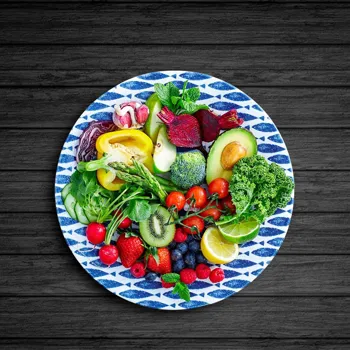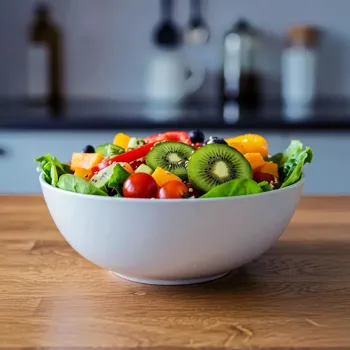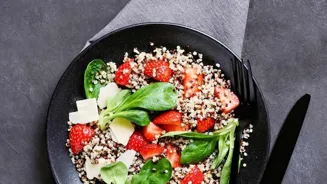Unlocking the Mystery: Nutrition's Impact on Mental Health. Delve into how food influences our mood, brain function, and overall well-being
In the bustling landscape of India, where chai flows freely and conversations
thrive on every street corner, a silent revolution is brewing—a growing awareness of the intricate link between what we eat and how we feel.
For generations, food has been celebrated as nourishment for the body, but its profound impact on the mind is only recently gaining the attention it deserves.
The connection between nutrition and mental health is a complex dance, with each influencing the other in ways we are only beginning to understand.
Mental well-being is not merely the absence of mental illness; it's a state of holistic wellness that encompasses emotional, psychological, and social aspects.
With the rising pressures of modern Indian life, from competitive careers to demanding family lives, nurturing our mental health has become more crucial than ever. And, believe it or not, the answer might be as close as our kitchen pantry.
Let's dive into the heart of this connection and explore how a mindful approach to nutrition can empower us to cultivate a healthier and happier mind.
The Gut-Brain Connection: A Two-Way Street
Imagine your gut as a bustling city, teeming with trillions of microorganisms, collectively known as the gut microbiota. This vibrant ecosystem plays a pivotal role in not just digesting our food but also influencing our brain function and mental health.
This connection, the gut-brain axis, is a sophisticated communication network operating through various pathways, including the vagus nerve, hormones, and neurotransmitters.
The gut microbiota influences the production of neurotransmitters like serotonin, dopamine, and GABA, which are the brain's chemical messengers that regulate mood, anxiety, and sleep.
An imbalance in the gut microbiota, often triggered by a diet lacking in diversity and rich in processed foods, can disrupt the production of these crucial neurotransmitters, potentially leading to mood disorders, anxiety, and even depression.
Furthermore, the gut is also responsible for producing short-chain fatty acids (SCFAs), which have anti-inflammatory properties and can protect the brain from inflammation.
Chronic inflammation has been linked to various mental health conditions, making SCFAs essential for maintaining a healthy brain.
Key Nutrients for a Happy Mind
While a balanced diet is undoubtedly key, certain nutrients stand out for their profound impact on mental well-being.
Incorporating these into your daily meals can be a powerful step towards nurturing a healthier mind.
B Vitamins
These water-soluble vitamins play a critical role in energy production and nerve function. Deficiencies in B vitamins, particularly B12 and folate, have been linked to depression and cognitive decline. Good sources include leafy green vegetables, legumes, nuts, and seeds.

Omega-3 Fatty Acids
Found abundantly in fatty fish, flaxseeds, and walnuts, omega-3 fatty acids are essential for brain health. They help reduce inflammation, improve brain cell function, and regulate mood. Studies have shown that omega-3 supplementation can be effective in managing symptoms of depression and anxiety.
Magnesium
This mineral helps regulate various bodily functions, including nerve and muscle function. It also has a calming effect on the brain, reducing anxiety and promoting sleep. Rich sources include leafy greens, nuts, seeds, and whole grains.
Vitamin D
Often called the "sunshine vitamin," vitamin D plays a vital role in mood regulation. Low levels of vitamin D have been associated with depression and seasonal affective disorder (SAD). While sunlight is the best source, certain foods like fortified milk and eggs can also contribute.

Zinc
This essential mineral is involved in numerous enzymatic processes in the brain, including neurotransmitter production. Zinc deficiency has been associated with anxiety, depression, and cognitive impairment. Sources include nuts, seeds, whole grains, and legumes.
Foods to Embrace and Foods to Limit
Now that we know which nutrients are crucial, let's talk about how to incorporate them into our daily meals. A balanced diet rich in whole, unprocessed foods is the cornerstone of a healthy mind.
Foods to Embrace:
Colorful Fruits and Vegetables
A rainbow of fruits and vegetables provides a wide array of vitamins, minerals, and antioxidants, protecting the brain from damage and promoting cognitive function.

Whole Grains
Opt for whole grains like brown rice, oats, and whole wheat over refined grains. Whole grains provide sustained energy and fiber, which supports gut health.
Legumes
Beans, lentils, and chickpeas are excellent sources of protein, fiber, and B vitamins, contributing to both physical and mental well-being.
Nuts and Seeds
A handful of nuts and seeds a day provides healthy fats, protein, vitamins, and minerals that nourish the brain.
Processed Foods
These are often laden with unhealthy fats, sugar, and additives, which can harm gut health and contribute to inflammation.
Sugary Drinks
Excessive sugar intake can lead to mood swings, energy crashes, and long-term mental health problems.
Simple Steps for a Happier Mind
Making dietary changes can seem daunting, but small, sustainable steps can lead to significant improvements in mental well-being. Here are some practical tips to get you started:
Start with Breakfast
A nutritious breakfast kickstarts your metabolism and provides your brain with the fuel it needs to function optimally throughout the day. Opt for oatmeal with fruits and nuts, or a whole-wheat toast with avocado.
Hydrate Regularly
Dehydration can lead to fatigue, headaches, and impaired cognitive function. Aim for at least 8 glasses of water a day.
Snack Smart
Skip the processed snacks and reach for fruits, vegetables, or a handful of nuts instead.
Cook at Home
Preparing your own meals allows you to control the ingredients and ensure you're eating wholesome, nutritious foods.
Practice Mindful Eating
Pay attention to your food, savor each bite, and eat slowly. This can improve digestion and help you feel more satisfied.
In closing, remember that nurturing your mental health is a journey, not a destination. By understanding the intricate connection between nutrition and mental well-being, and by making conscious choices about what we eat, we can empower ourselves to lead healthier and happier lives. It's about embracing a holistic approach to well-being, where the nourishment of the body and the mind go hand in hand. And in a country as diverse and vibrant as India, let's celebrate the power of mindful eating as a pathway to a brighter, mentally healthier future.
Paragraphs with 3 sentences each:
The link between what we consume and mental well-being is crucial. It highlights that our choices about beverages, grains, leafy vegetables, fruits and processed items plays role in mental states.

The food we consume can affect our neurotransmitters which are responsible for regulating mood, anxiety and sleep.
The link between the gut and the brain is a very complex and sophisticated.
The gut microbiota influences the production of neurotransmitters like serotonin, dopamine, and GABA, which regulate mood. These neurotransmitters impact moods, anxiety, and quality of sleep.
Certain nutrients stand out for their impact on mental well-being.
B vitamins and mineral Magnesium are responsible for nerve function by regulating mood. Incorporating leafy vegetables,legumes,nuts, seeds are important steps for nurturing the mind.
Embrace colorful fruits and vegetables for vitamins, minerals, and antioxidants.
Opt for whole grains for sustained energy. Embrace legumes for protein, fiber, and B vitamins for overall well being.
Limit processed foods with too much fats and sugar leading to inflamamtion and harming the gut health. Avoid sugary drinks for avoiding mood swings,crashes and mental health issues.
These are small changes that can have a big impact on a persons mental health.
The simple steps such as starting the day with healthy breakfast is important. Hydrating our body with lot of water everyday is esssential. Snacking with fruits,vegetables is a healthier option than processed foods.














